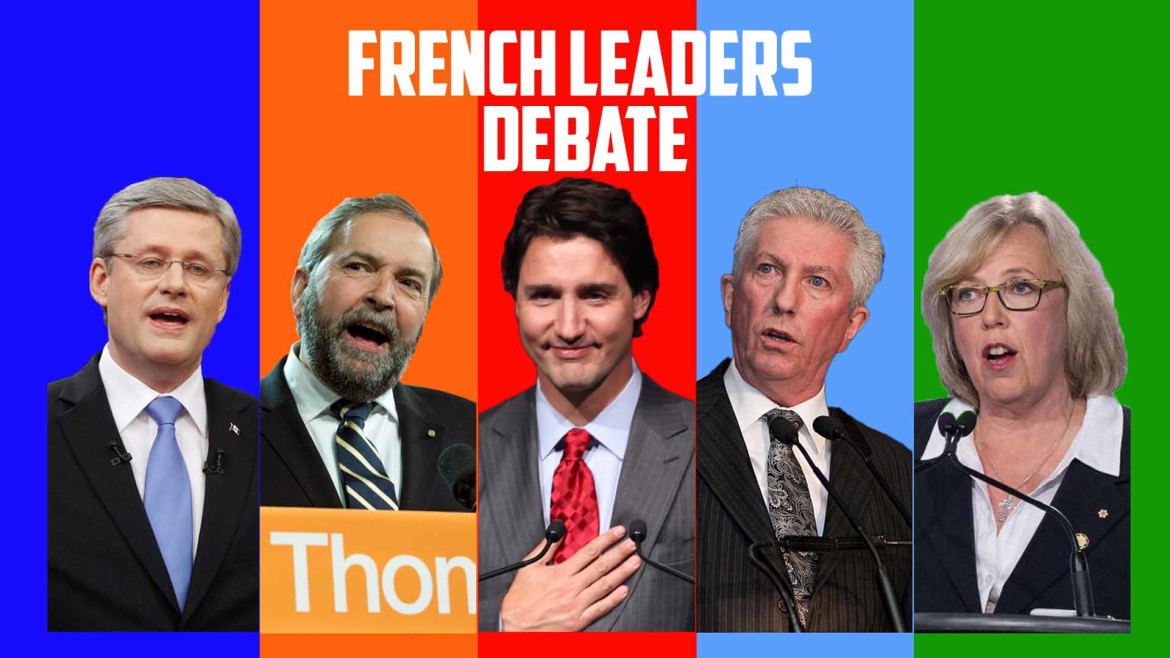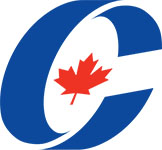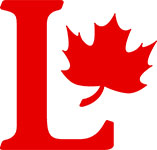With a three-way tie between the Conservatives, NDP and Liberals in the polls, the stakes were high going into Thursday night’s French debate. The first to feature all five party leaders, the debate proved to be a dynamic and lively atmosphere, with attacks made from all sides.
The debate provided a venue for the five leaders to demonstrate who they are and what they stand for, painting a more clear portrait of each party and their respective leaders.
While some experts were surprised that issues, such as the niqab debate, Québec sovereignty and pipelines did not factor as prominently in the debate, it is important to note that these issues were the sources of the debate’s most heated discussions amongst the leaders.
The Leaders
With the Bloc Québécois’ failure to thrive in the polls in Québec and less to lose than the other party leaders, Gilles Duceppe came out strong, given his experience participating in debates and the clear language advantage. Duceppe stuck to tactics demonstrated in previous debates wherein he demanded to know the answers to controversial questions from the four leaders – most of them seeking more powers to the province – and trying to demonstrate his party is the only one who can protect Québec’s interests.
As the frontrunner in Québec, making him the main target throughout the debate, NDP party leader, Thomas Mulcair, had a lot to lose. Overall, he performed well, however, viewers caught several glimpses of ‘Angry Tom’ when he allowed himself to be sidetracked by several passionate exchanges with Duceppe and Trudeau surrounding Québec sovereignty. Seemingly, Mulcair allowed himself to be a bit more animated than past debates. Perhaps threatened by the Conservatives’ recent gains in the polls in Québec, Mulcair focused the majority of his attacks on Harper, accusing him of failing to protect employment in Canada and telling lies about the NDP’s platform.
While Trudeau remained more composed than in previous debates, he failed to deliver targeted messages about Québec – the province where his party is looking to make some major gains. Some of Trudeau’s responses lacked substance as he seemed to repeat the same lines over and over.
Harper was more removed from this debate compared to previous discussions, given his noticeable weakness in the French language. He spent most of the debate defending the Conservative record and making sure his voice was heard on key topics such as the economy, an area of strength. A position that plays well with the Conservative base in Quebec, unveiling for citizenship ceremonies, was among Harper’s key talking points.
While polls suggest the Green Party isn’t widely regarded as a contender for official opposition, Elizabeth May’s performance, despite the language barrier, likely accomplished more realistic objectives – to cement and shore up support within that party’s base.
Listed below are key themes from the debate:
A Government in service of Canadians
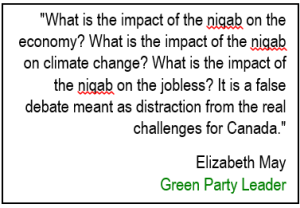 The debate began with Mulcair defending his “big promises” in the healthcare realm and his ability to deliver on them. Mulcair promised that his commitments were costed and that he intends to work with the provinces to better serve Canadians. This segment featured the first of many reminders that the Liberals intend to lower taxes for the middle class, as Trudeau spoke adamantly about his commitments.
The debate began with Mulcair defending his “big promises” in the healthcare realm and his ability to deliver on them. Mulcair promised that his commitments were costed and that he intends to work with the provinces to better serve Canadians. This segment featured the first of many reminders that the Liberals intend to lower taxes for the middle class, as Trudeau spoke adamantly about his commitments.
An emotionally charged topic and a constant issue in Québec, the right to wear a niqab at a citizenship ceremony proved to be an intense topic in this segment of the debate. This week, Mulcair was criticized for not having a clear stance on the issue. Harper and Duceppe seemed to have found common ground in this topic by contrasting themselves against the NDP’s now clear position, which was to allow women to be veiled at citizenship ceremonies. The heated exchanges between the five leaders were among the most memorable moments of the debate.
Economy
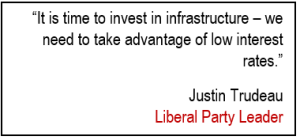 On diversifying the economy, Harper called on his party’s record of investing in infrastructure and providing incentives to develop new technology.
On diversifying the economy, Harper called on his party’s record of investing in infrastructure and providing incentives to develop new technology.
Harper’s four counterparts accused him and the Conservatives of putting all of their faith into the oil and gas sector, thereby attempting to communicate to viewers that it was Harper’s fault if unemployment has risen. In this segment of the debate, worth noting was Mulcair’s commitment to working with all sectors, including oil and gas in order in order to maintain a stable economy.
Trudeau brought up his intentions of cancelling the Lockheed Martin F35 jet purchase – a commitment that he recently announced when he unveiled the Liberal party’s defense strategy. Trudeau would scrap the purchase of the F35 jets in favour of creating more jobs in Canada.
Governance, Democracy and Institutions
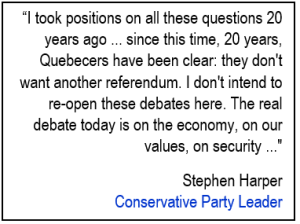 This segment of the debate featured impassioned discussions about abolishing the senate and rules around Québec sovereignty. When the leaders delved into senate scandals, Mulcair, who is in support of abolishing the Senate, was quick to point out that Canadians have a history of going back and forth between the Liberal party and the Conservative party when they grow tired of each party’s scandals. He reminded the leaders that Canadian voters now having a third choice on the ballot – the NDP.
This segment of the debate featured impassioned discussions about abolishing the senate and rules around Québec sovereignty. When the leaders delved into senate scandals, Mulcair, who is in support of abolishing the Senate, was quick to point out that Canadians have a history of going back and forth between the Liberal party and the Conservative party when they grow tired of each party’s scandals. He reminded the leaders that Canadian voters now having a third choice on the ballot – the NDP.
As anticipated, the question of negotiating a Québec referendum questions with Ottawa was largely discoursed throughout this segment of the debate. For the most part, leaders stuck to the same lines that they held throughout the Maclean’s debate. Duceppe and Mulcair continued to support the “50 per cent + 1” side while Harper argued that the issue must be laid to rest. Trudeau argued that a simple majority is not enough to trigger negotiations that could lead to Québec separation.
The Environment
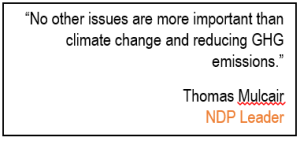 The environment side of the debate started off with the topic of climate change. Harper stated his optimism that Canada will reach an agreement in Paris this year, while the rest of the leaders criticized him for ruining Canada’s reputation as a world leader in the fight against climate change.
The environment side of the debate started off with the topic of climate change. Harper stated his optimism that Canada will reach an agreement in Paris this year, while the rest of the leaders criticized him for ruining Canada’s reputation as a world leader in the fight against climate change.
Mulcair, who repeatedly referred to his past as a Québec Environment Minister, was confronted by Duceppe and Trudeau on his previous comments regarding bulk water exports and energy east, an issue wherein he was criticized for providing conflicting comments in French and English.
Strongly opposed to TransCanada’s Energy East pipeline project, Duceppe referred to Mulcair’s apparent duality when it comes to energy issues in Québec and in the rest of Canada, saying, “Does Tom sometimes speak to Thomas?”. This quote refers to Mulcair’s first venture in the national campaign when Duceppe accused “Thomas Mulcair” of sounding less in favour of Energy East in French and “Tom Mulcair” of favouring oil sands development when speaking in English.
Canada’s place in the world
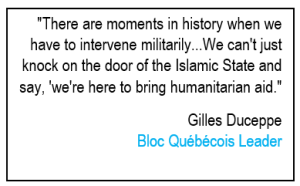 The last part of the debate focused on where Canada stands in the world. Given the ongoing Syrian refugee crisis and the military mission in which Canada is involved, this component of the debate was characterized by spirited discussions.
The last part of the debate focused on where Canada stands in the world. Given the ongoing Syrian refugee crisis and the military mission in which Canada is involved, this component of the debate was characterized by spirited discussions.
While Harper focused on the importance of continuing pressure against terrorist groups, Trudeau maintained the Liberal position that Canada must stop the bombing and instead work with local military groups to help in the fight against ISIL.
The leaders focused their criticism on Harper’s inaction in the refugee crisis.
The Impact
With over three weeks left remaining in the federal election – will the fiery discussions that took place in Montreal on Thursday night affect how Canada votes? It is unlikely that the Radio-Canada debate will not be a turning point in this campaign, though how exactly it will impact Canadian votes as a whole is still uncertain.
One thing that is certain is that the race is not over. Each candidate continues to battle for votes as the polls reveal many Canadians remain undecided.
A second French language debate will be hosted by TVA on October 2.

